Oct. 1, 2010
Publications
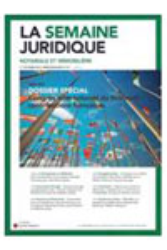
► Référence complète : M.-A. Frison-Roche, "Acte authentique, acte de marché", JCP notarial, 2010, 1290.
____
► Résumé de l'article : l’acte authentique est souvent opposé au marché, notamment en ce qu’il appartient au droit civil, alors que le marché relève du droit économique, et qu’il n’est que la forme la plus élevée des actes probatoires, sans contact avec la logique marchande. Ces perspectives ne sont pas exactes.
Tout d’abord, l’acte authentique n’est pas un acte qui prouve, c’est l’inverse ; il dispense de prouver. Cette "anti-preuve" rend le negotium incontestable, sans que l’agent économique n’ait plus à se soucier de son exactitude, diminuant ainsi par cette sécurité purement juridique les coûts de transaction. En cela, l’acte authentique est l’acte normatif par excellence et seul le notaire, rattaché à l’État, qui diminue ainsi les externalités négatives du marché, peut lui donner ce pouvoir. Le notaire est alors le régulateur naturel des marchés ainsi intermédiés, dont il diminue les risques.
____
________
Feb. 12, 2008
Publications
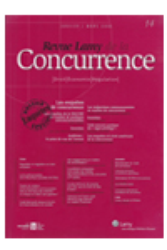
Référence complète : FRISON-ROCHE, Marie-Anne, Regulation et Régulation en droit européen, Revue Lamy de la Concurrence, janvier/mars 2008, p.154-155.
Jan. 11, 2007
Publications

June 7, 2006
Publications
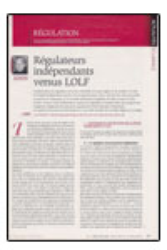
Référence complète : FRISON-ROCHE, Marie-Anne, Régulateurs indépendants versus LOLF, Revue Lamy Concurrence, 2006, pp.69-73.
Les régulateurs doivent être, par un effet de nécessité, indépendants. Cela les met en contradiction naturelle avec la LOLF, puisque celle-ci rassemble des crédits rattachés à des actions, des objectifs et des résultats évalués, sous la responsabilité d’un chef de programme. L’insertion d’une autorité de régulation dans cette architecture brise l’indépendance substantielle du régulateur, gouverné par la régulation budgétaire, maniée par le directeur du programme organisé par la LOLF. Or, "régulation sur régulation ne vaut". Il faut donc tendre vers la meilleure compatibilité possible entre régulateurs indépendants et LOLF. Il peut s’agir de regrouper les autorités de régulations économiques dans un programme budgétaire qui leur soit propre et dont le directeur ait des pouvoirs limités par l’indépendance des régulateurs. Plus radicalement et plus logiquement, il peut s’agir de sortir le régulateur de la LOLF par l’autonomie d’exécution budgétaire et de gestion et l’attribution de la personnalité morale, comme dans le cas de l’AMF. Le prix à payer en est la pleine responsabilité du régulateur.
Lire le résumé de l'article ci-dessous.
May 18, 2006
Publications
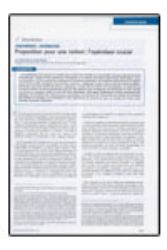
► Full Reference: Frison-Roche, M.-A., "Proposition pour une notion : l’opérateur crucial" (Proposal for a notion: the "Crucial Operator"), D. 2006, pp.1895-p.1900.
____
► Article English Summary: The market is conceived as having two kinds of actors: operators and regulators. But we can suggest a third term: the crucial operator. This notion, proposed here, assumes that the sector cannot function without it. It could be a network manager or a systemic company, the failure of which produces a domino effect, or a structure that maintains a system like the financial market companies. These kinds of "second-tier regulators" then have more rights and more obligations. They are either holders of essential infrastructure, or bearer of capital innovation, or centralize system risks. The regulatory systems should be rethought by integrating these "crucial operators".
____
____
► More developed Article English Summary: Competition Law neutralizes economic agents who act on the markets, by the rule of capital neutrality. Thus, the company is a transparent legal concept, which erases the specificities of organizations. Public enterprises are therefore only considered as an enterprise and the notion of "national champion" is rejected.
To escape this neutrality, without falling into the arbitrariness of the States against which Competition Law rightly fights, there is great interest and relevance in developing the concept of crucial operator.
The idea of a crucial operator is to no longer think of it in a neutral way, not in relation to its capital or those who govern it, but in relation to its market behavior. In fact, cruciality can be defined as the quality of an organization which puts in its dependence the efficiency and the good functioning of other organizations. In this, cruciality is the opposite of competition, which postulates that the company not only does not depend on others but also will seek by nature to harm it by appropriating demand to the detriment of its competitors. But it may happen that the market cannot be satisfied with the aggressive mobility that is competition and supposes the stability and support of others operated by the crucial operator.
This is so when the operator is the manager of an essential infrastructure since the other operators depend on it. This is also the case when the operator is the bearer of market innovation, which justifies access rights under essential facilities or agreements to produce research. The third case is when the operator carries the risks of the system, which explains why banks and financial institutions are most often crucial operators in that they carry the systemic risks of the banking and financial system. It is thus measured that the public or private character does not interfere in the qualification of crucial operator any more than the monopolistic character or not of the operator considered.
The consequences of such a qualification as a crucial operator is that the operator must have more obligations than an ordinary operator. Thus, the infrastructure manager has the obligation to open it to third parties, even though control usually generates a power of exclusion. Similarly, financial or insurance institutions, because they must prevent risks, will be obliged by specific prudential standards. But the crucial nature of the operator gives him rights but also powers. This is how market companies, operators of private law who hold the places, have a disciplinary power of exclusion that some have compared to the power of the State.
What is more, the crucial operator then appears to be a "second tier" regulator. Indeed, according to a pyramid figure, ordinary operators are subject to the disciplinary power of crucial operators who themselves are governed by public regulators, who are the first rank regulators. This quality of second-level regulator obliges the operator to behave towards his competitors with the same virtue as that which characterizes the regulator and first of all impartiality. This is the case with non-discrimination in accessing the network from its own competitors. In addition, a regulator must be accountable and behave in a transparent manner, while the ordinary operator is not subject to this principle, since competition law does not require transparency of structures and behavior. This link between regulation and governance clearly applies to financial operators, but it is also observed with regard to network operators.
We thus measure that if positive law, giving form by a last effort of vocabulary to established rules, recognized the existence of the notion of crucial operator, it would better identify this intermediate category between the ordinary operator and the regulator, because the crucial operator is a company, entering into the game of supply and demand but it also supports the stable structure of the market and the stability of this market, which is not the usual aim of companies.
________
Nov. 8, 2005
Publications
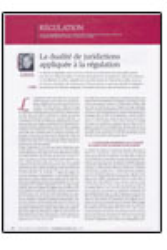
Référence complète : FRISON-ROCHE, Marie-Anne, La dualité de juridictions appliquée à la régulation, Revue Lamy Concurrence, n°5, nov./déc. 2005, pp.90-93.
Oct. 12, 2005
Publications
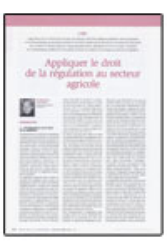
Référence complète : FRISON-ROCHE, Marie-Anne, Appliquer le droit de la régulation au secteur agricole, Revue Lamy Concurrence, n°4, août/octobre 2005, 126-130.
Oct. 12, 2005
Publications
Référence complète : FRISON-ROCHE, Marie-Anne, Vers un gouvernement économique des juges ?, Revue Commentaire, automne 2005, vol.28/numéro 111, pp.631-639.
July 7, 2005
Publications
March 30, 2005
Publications
Référence complète : :Frison-Roche, M.-A., "Le droit économique donne la priorité à son objet et en épouse les contours", Petites Affiches, 30 mars 2005, pp.3-8.
____
____
Feb. 9, 2005
Publications
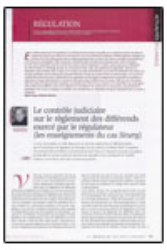
Référence complète : FRISON-ROCHE, Marie-Anne, Le contrôle judiciaire sur le règlement des différends exercé par le régulateur (les enseignements du cas Sinerg), Revue Lamy Concurrence, n°3, mai/juillet 2005, pp.107-110.
Feb. 8, 2005
Publications

Référence complète : FRISON-ROCHE, Marie-Anne, Régulation et contrat è présentation du thème et synthèse du 11ième Forum de la régulation, Petites Affiches, 3 mai 2005, pp.3-10.
Nov. 5, 2004
Publications
Référence complète : FRISON-ROCHE, Marie-Anne, La maturation de la régulation énergétique par la loi du 9 août 2004, Revue Lamy Concurrence, n°1, nov. 2004, pp.131-135.
Oct. 22, 2004
Publications
Référence complète : FRISON-ROCHE, Marie-Anne, Régulation et règlement des différends : présentation du thème et synthèse du 10ième Forum, Les Petites Affiches, n°212, 22 octobre 2004, pp.6-12.
July 16, 2004
Publications
April 22, 2004
Publications
Référence complète : FRISON-ROCHE, Marie-Anne, Définition du droit de la régulation économique, D.2004, chron., pp.126-129.
L'article a été également publié en langue espagnole : Definiçao do Direito da Regulaçao Economica, Revista de Direito Publico da Economica, janv/mars 2005, n°9, p.207-217.
March 11, 2004
Publications
Feb. 3, 2004
Publications
Référence complète : FRISON-ROCHE, Marie-Anne, Contrat, concurrence, régulation, RTD civ. 2004, pp.451-469.
Jan. 31, 2003
Publications
Référence complète : FRISON-ROCHE, Marie-Anne, Le contrôle des organes de régulation (l’exemple du NYSE), D.2003, chron., p.2810-2812.
April 12, 2001
Publications
Référence complète : FRISON-ROCHE, Marie-Anne, "Le droit de la régulation", D.2001, chron., pp.610-616.
____
Pour lire l'article, cliquez ici
Feb. 1, 2001
Publications
Jan. 29, 2001
Publications
► Full reference: Frison-Roche, M.-A., "Le droit de la régulation", D.2001, chron., p.610-616.
____
► Read the article (in french)
______
Aug. 2, 1999
Publications
► Référence complète : M.-A. Frison-Roche, "Les règles d’appréciation du contrôle minoritaire", L’Agefi, 2 août 1999.
____
June 23, 1999
Publications
March 16, 1999
Publications
Référence complète : FRISON-ROCHE, Marie-Anne, La considération de la jurisprudence dans le nouveau titre V du Règlement général du Conseil des Marchés Financiers, RJDA 1999, pp.9-13.